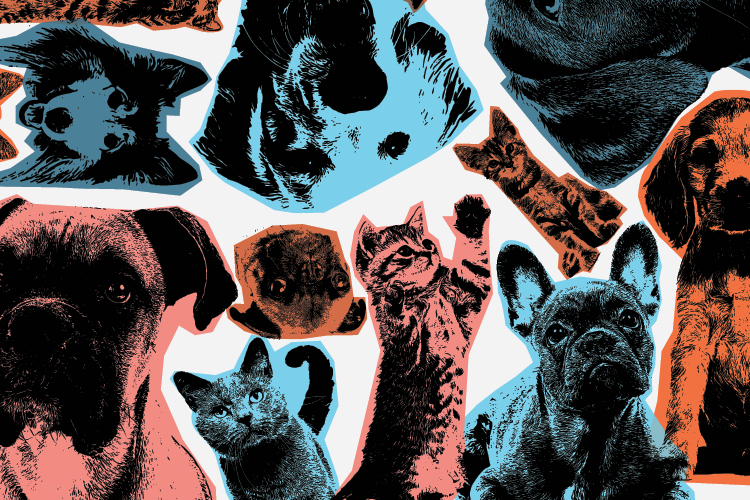A lawyer's passion for pets prompts career switch

Illustration by Sara Wadford/Shutterstock
A few months before the beginning of the COVID-19 pandemic, I left federal government service as an attorney for a maritime regulatory agency to honor my life’s mission to work in the pet health equity space. Pet health equity is a growing field dedicated to providing access to veterinary care and veterinary products for companion animals, regardless of their owner’s resources and location.
I joined ElleVet Sciences, an animal supplement company, as vice president and general counsel, which meant moving from the hustle and bustle of the Baltimore-Washington, D.C., area to its headquarters in the serene beauty of South Portland, Maine. It was a 180-degree change, but one that I’d been preparing for most of my life.
My journey helping dogs and other companion animals began well before I joined ElleVet. Growing up, I always had an affinity for pets, particularly canines. My family had dogs from shelters and breeders. The first dog I adopted when I became an adult, Louis Luigi, inspired me to use my experience practicing law to help companion animals. After he passed from cancer, I adopted two dogs that had been difficult to place: Rudi, an Alaskan malamute that came from an animal hoarder in North Carolina; and Yeong-Mi—a malamute/American Eskimo mix that was rescued from the dogmeat trade in South Korea.
Growing need
During my service on the Maryland State Bar Association Animal Law Section board, I learned about terms like “economic euthanasia,” which is when a pet is euthanized because its owner cannot afford to pay for necessary treatment. This is unfortunately not an uncommon scenario. Many people suffer loss of income that can drain financial resources and impair the ability to afford veterinary care to save their pet. The current rising inflation, from which vet costs are not immune, combined with a growing shortage of veterinarians in general, can make it difficult to access needed treatment. This is an even more dire challenge for people who are homeless or those with limited means.
Shortly after starting with ElleVet, the CEO called me with a proposal: The company wanted to provide free veterinary care to pets of the unhoused in California and to people who had lost their jobs due to the pandemic. ElleVet planned to recruit and hire veterinarians to provide free care, including vaccinations and wellness exams, outside of a roving RV that would be called the ElleVan. The company would provide supplies, medication, food and supplements for the pet patients.
My initial thoughts were: What an amazing and insane idea. Amazing because of the need; insane because we were starting from scratch and had one month to plan. We were at the beginning of the pandemic, and cities had restrictions for public gatherings. Would veterinarians want to risk interacting with strangers and their pets? Would the people who are homeless and others with limited means even show up given the COVID-19 risk? How would I make this happen given the time frame, pandemic restrictions and my other legal responsibilities with the company?
Despite the tough time frame, we found and secured veterinarians and locations throughout California for the ElleVan to provide free veterinary care. We were able to form partnerships with nonprofits and government organizations, convincing them that vaccinating and treating pets was imperative, even during the pandemic, to protect pet health as well as humans from rabies and other zoonotic diseases.
The result of the hard work and collaboration was that more than 1,200 pets of people with limited financial means were vaccinated and treated from May to July 2020. But our campaign exposed the extraordinary need for free veterinary care for pets of the unhoused and other folks with limited means. As a result, we created the ElleVet Project, a 501(c)(3), and have been able to expand the program across the country to states including Florida, Montana, Nevada and Washington.
Lifelong commitment
Increasing access to veterinary care and access to products that help pets is deeply fulfilling work for me. Before joining ElleVet full time, I worked as a consultant developing legal strategies and ways to promote access to veterinary care for the Program for Pet Health Equity at the University of Tennessee Knoxville Veterinary School of Medicine. I also developed and executed strategies that created access to hemp CBD products for pet owners and veterinarians as a consultant for ElleVet. I served as the first member of the U.S. Department of Agriculture Secretary’s Advisory Committee on Animal Health appointed solely to represent animal welfare issues. And during my time as the chair of the ABA Tort Trial and Insurance Practice Section Animal Law Committee, I participated in pet vaccination clinics and helped socialize dogs rescued from the Korean dogmeat trade that were at an animal shelter in New York. I also served on the Baltimore Animal Rescue and Care Shelter board. I did all of this while working full time as a federal attorney because it was my true passion.
I rarely see other Black attorneys—let alone Black women—working in animal law, and I am hoping to forge a path and set an example for others to engage in this field. I initially worried that I would experience the sort of discrimination and hostility I often encountered in the mostly white and male maritime industry. But I’m grateful that I made the leap despite these fears, and what’s proved most fulfilling has been dedicating my time and efforts to a career I love.
This story was originally published in the December 2022-January 2023 issue of the ABA Journal under the headline: “Pursuing Pet Health Equity: A lawyer’s passion for pets prompts career switch.”
Stacey Evans is vice president and general counsel at ElleVet Sciences, where she develops legal strategies around the use and sale of hemp-derived CBD products to veterinary practices. She is a past chair of the ABA TIPS Animal Law Committee.
Character Witness explores legal and societal issues through the first-person lens of attorneys in the trenches who are, inter alia, on a mission to defend liberty and pursue justice.
This column reflects the opinions of the author and not necessarily the views of the ABA Journal—or the American Bar Association.



